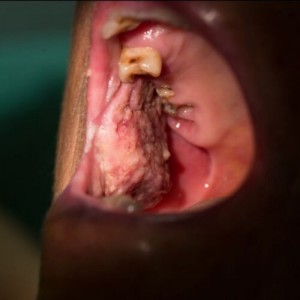
Multi-center Study Shows SDF Halts Tooth Decay in Kids
Silver diamine fluoride (SDF) can stop tooth decay in young children when the topical liquid is brushed onto teeth, according to a large clinical trial funded by the National Institute of Dental and Craniofacial Research (NIDCR). The preliminary results, recently published in Pediatric Dentistry, show that 54% of cavities stopped progressing after SDF treatment, compared to 21% of those treated with a placebo.
NYU College of Dentistry was one of three clinical sites in the trial, which also included the University of Michigan and the University of Iowa. The overall study was led by Margherita Fontana, DDS, PhD, of the University of Michigan.
“The impact of this trial could be tremendous as it can offer us another tool in our toolkit for managing tooth decay in young children: a less invasive approach that can stop the progression of cavities without shots, drills, or fillings. We hope that access to this simple treatment could also help in reducing oral health disparities,” said Amr M. Moursi, DDS, PhD, professor and chair of the Department of Pediatric Dentistry and principal investigator at the NYU study site.
SDF is cleared by the Food and Drug Administration for treating dental sensitivity and is used off label to treat tooth decay, also known as cavities or dental caries. It can be easily and painlessly swabbed onto cavities and has been widely used for management of tooth decay in other countries for decades. Studies suggest that the silver in SDF kills cavity-causing microbes and helps stop destruction of the tooth, while the fluoride helps to rebuild and strengthen the tooth.
“Current treatments for severe early childhood caries rely on restoration and tooth extraction, which can involve general anesthesia,” said Dr. Fontana, the study’s lead investigator. “These interventions are expensive, cavities often return, and anesthesia can have long-term effects on a developing brain. We didn’t really have any other options until recently—SDF is a game changer.”
Researchers recruited children between the ages of 1 and 5 with severe tooth decay. An interim analysis of 599 children evaluated the proportion of cavities in which decay progression was stopped six months after a single treatment with SDF or a placebo.
Because the interim analysis revealed that SDF was effective in halting the progression of cavities, the trial was stopped early. Ending a trial early can allow particularly effective interventions to move toward FDA approval and become available to patients sooner. The team also reported no safety concerns with the treatment.
“SDF marketing authorization from FDA for treating dental cavities could lead to SDF becoming more widely available; more acceptable among providers, patients, and parents; and more likely to be covered by insurance,” said Dena Fischer, DDS, MSD, MS, director of NIDCR’s Center for Clinical Research and the Clinical Trials and Practice-Based Research Program. “Increasing patients’ access to caries treatment is essential for reaching children who are most in need.”
Researchers are now analyzing the final data from more than 800 children, including assessing SDF’s effects on tooth pain and quality of life, as well as potential side effects. Because SDF can darken the color of cavities, which may not be aesthetically pleasing, the researchers are also evaluating patient and parent satisfaction and acceptability.
“Oral health problems, such as untreated tooth decay, can have many public health impacts that affect both children and adults,” said NIDCR Director Rena D’Souza, DDS, PhD, MS. “This study provides evidence that SDF could be a powerful tool against cavities and help improve health and well-being of children.”
Tooth decay is the most common chronic disease of childhood, affecting nearly 46% of children in the United States, according to the Centers for Disease Control and Prevention. It disproportionately affects Hispanic and non-Hispanic Black children and children from lower-income households. Left untreated, cavities can put children at risk for chronic pain, impaired development, and long-term oral and overall health problems.
This research was supported by NIDCR grant UH3-DE027372.
Source: https://dental.nyu.edu/
 Related articles
Related articles
Editorials 22 October 2025
She will examine how Medicaid adult dental coverage and preventive dental visits influence diagnosis and survival outcomes for oral and pharyngeal cancers.
Implantology 17 October 2025
To investigate whether cross-section imaging influences the planning and therapy of standard implant cases in the posterior mandible.
Oral surgery 22 September 2025
Minor oral surgical procedures in patients on oral anticoagulants—a controlled study
Patients on therapeutic anticoagulation are at risk of bleeding from minor oral surgical sites.
News 09 September 2025
Chemomouthpiece, LLC, a privately held medical device company that develops and commercializes supportive cancer care products, today announced that the peer-reviewed results from its pivotal,...
Editorials 25 August 2025
Dr. Joshua Emrick’s Team Sheds New Light on Protective Tooth Nerve Function in Cell Reports Study
Joshua J. Emrick, DDS, PhD, assistant professor in the Department of Biologic and Materials Sciences & Prosthodontics (BMSP), shines a spotlight on the sensory neurons in teeth in a recent...
 Read more
Read more
Oral surgery 27 October 2025
The authors assessed the incidence of postoperative bleeding in patients who were highly anticoagulated and in patients who underwent extensive oral surgical procedures and who continued using oral...
With a new name, Tufts Special Care Dental Clinics continues a 50-year mission of treating people with intellectual and developmental disabilities
Ultradent Products, Inc., a leading developer and manufacturer of high-tech dental materials, is announcing the launch of VALO X Colors: new, vibrant finishes for the award-winning VALO X curing...
News 27 October 2025
OrthoFX, a leading innovator of shorter wear time aligner systems, announces AirFlex with new PrecisionFinish Aligners.
News 27 October 2025
Young Innovations Strengthens North American Leadership Team
Young Innovations, a leading global manufacturer and distributor of dental supplies and equipment, is pleased to announce two significant additions to its North American leadership team as part of...















